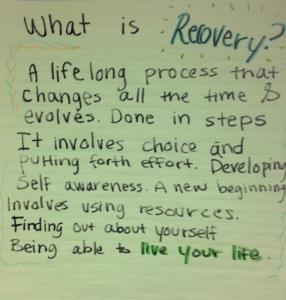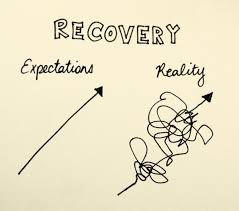With it being National Eating Disorder Awareness Week, I wanted to take the time out of my night to sit down and write something meaningful about this week. Reading post after post of individuals’ stories about life in the grips of an eating disorder and how they’re now on the other side, I decided I wanted whatever I wrote to be a little different. But how do you make your writing different from the thousands out there that are writing about the same issues?
I have noticed a theme over the week within those posts, however. There’s always that silver lining moment at the end where the writer describes how much life has gotten better since they entered recovery, and I have to agree that it’s a fucking incredible thing being in recovery and not having the obsessions about food and weight on your mind 24/7. But the posts always end there, leaving a sort of cliff hanger, especially for those of us who know what going through the recovery process is like. But what I want to touch on is something I haven’t read much of in the posts:
The bad days of recovery.
Because guess what guys, it’s not always an easy task and some days those thoughts and desires to once again self-destruct come running back to you. People expect you to struggle while you’re getting back on your feet while in treatment, whether that be inpatient or outpatient. But what I’ve noticed in my own life is that nobody really talks about the struggle so many of us face after we’re discharged from a treatment program and are fully integrated back into our lives. That’s when, at least in my opinion, real recovery starts and is tested on almost a daily basis.
I’ve gone a couple of weeks without the intrusive thoughts about my weight and calories, but something I’ve noticed is that it always comes back. We learn skills to fight those thoughts out, as well as behavioral components to engage in to not fall back into the very thing we were once so comfortable in. My own therapist has told me countless times that yes it may be so much easier to just say ‘fuck it’ and go back into living a life of an eating disorder, but there’s so much more to lose at this point in your life now that you have experienced what living is supposed to be like.
Let’s be real here for a moment though guys, sometimes the idea of living this new life, for the rest of our life mind you, seems overwhelming. Some days I wake up and don’t want to continue living this life of recovery. Some days I want to jump right back into the arms of an eating disorder, because coping with the emotions that come from every day life experiences can really fucking suck. They talk about the ebbing and flowing of motivation for recovery in treatment all the time, but just because you’ve been discharged from a program doesn’t mean that ever really stops. It becomes less frequent of an issue, but an issue still nonetheless.
You can go weeks feeling on top of the world and loving the life you worked so hard to get, but some days those thoughts and physical feelings can come back and come back with a vengeance. It’s in those moments though, that you really have to put all of those skills that were drilled into your head into use. It’s a struggle, because now you have insight. You know you can kick those thoughts’ ass, you know you can hold off on engaging in whatever behavior it is your head is telling you to do, and you know all of the things that you could lose by letting yourself get engulfed in those thoughts and actions for even just a day. Because I think we all know that a lot of the time, that one day is all it takes to flip that switch and you’re plummeting backwards.
But unlike the days you were in treatment, there’s not that team of people right there to catch you before you smash into the ground. So it’s all you, and you know you can do it if you choose to. It’s those choices that can either make or break you. It all comes down to choice. There’s this internal battle you enter into with your old self and the new, more insightful self. So what are you going to do? The guilt of fucking up and having to explain to either your doctor or your therapist as to why the scale says you lost weight when you go in for your next appointment or session can be overwhelming enough. To be honest, that has been something that has kept me on my toes a lot over the past year. Having to come up with some lie that seems like a legit excuse isn’t really worth it, because if your therapist is good at their job, they’ll dissect the shit out of what you just told them until they reveal the truth behind the fact you lost weight again.
But I guess I should probably end this post on a positive note, eh? I mean shit if I stopped right there we’d all be fucking depressed and not want to continue trying our best to live a life of recovery. So here it goes, that silver lining moment we all love:
Some days of recovery suck. I mean really fucking suck. But it’s only a day, or a moment or a thought. It doesn’t have to become the catalyst that slides you backwards. If you’ve made it this far to where you can say you’re in recovery, well dammit you can make it past the shitty days too. Without trying to sound like one of those cheesy motivational posters that are scattered all over the place, you’ve already proven to yourself that you can do this. So when you really feel like recovery is a joke and you can no longer keep it up, remember the way you fucking rallied to get to where you are now, even if in that moment it feels like you didn’t make as much progress as everyone around you is telling you’ve made. It’s always hard to see the progress you made for yourself, but you did it yourself. So keep calm and stay strong.





You must be logged in to post a comment.